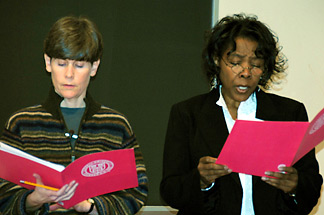Theater troupe teaches ethics in biology class by showing how not to take the easy way out
By Susan S. Lang

All the world's a stage -- and a biology class discussion on ethics is no exception.
Theater and biology may seem an unlikely pairing. But for the 650 first-year students in the introductory biology course for biology majors (BioG101and 105), an in-class performance by the Cornell Interactive Theater Ensemble (CITE) on Oct. 11 brought home the kinds of ethical issues they could face working in professors' laboratories.
The theater troupe, which is unique to Cornell, gets new students off on the right foot by portraying just how easy it is to fall into situations where they feel pressure to promote careers while pleasing busy professors, but also making convenient decisions that could come back to haunt them.
"CITE wrote, directed and acted two case studies adapted from the scientific literature involving ethical conflicts that might arise between students and postdocs, and between undergraduates and their mentors over conduct of scientific research," said Carl Hopkins, professor of neurobiology and behavior, who teaches the course. "Their acting helped launch my discussion on how to make decisions on ethical issues, how to understand where discomfort is coming from and why, and how decisions get made that might have serious consequences much later."
One scene involved a postdoctoral researcher and a graduate student collaborating on the analysis of measurements on the molecular structure of a protein they crystallized and imaged using a high-energy synchrotron X-ray source. Although most of the data fit perfectly with their famous professor's theory, two data points are inexplicably way off base. The two women argue about how to explain the outlying points.
The second scene involved a graduating senior who leaves a final experiment in the care of his professor's graduate student. The graduate student's findings fit perfectly in his analysis, and the professor suggests they publish the findings immediately, which they do. But a year later when the graduating senior, now graduate student, tries to replicate the groundbreaking findings, he can't, and he fears that his former collaborator may have fudged the data.
"CITE proved themselves to be an extraordinary teaching resource," Hopkins said. "By combining case studies with live acting, we had a real impact on teaching the ethics of research and responsible conduct in the biological sciences."
Hopkins asked CITE to write and dramatize the two case studies that depicted ethical concerns after he attended a two-day program for faculty featuring CITE. He wanted to show, he said, "life in the laboratory -- decision-making, working with colleagues, sharing data and discovery and the importance of mentoring."
"Carl provided the scientific content of the case studies and taught me everything I needed to know about the science," said Martha Dewey, artistic director of CITE. "I then shaped the written case material and created the scenario dramatizations to bring the cases to life. This collaboration was a unique opportunity to utilize the arts in science."
Although CITE has been available on campus for 15 years as a resource for Cornell educators (and off-campus for academic, nonprofit and corporate clients), "there are still many faculty who are not aware that interactive theater can be a useful tool in the classroom, no matter what the curriculum," Dewey added. "To our knowledge, Cornell is currently the only university with a full-time professional interactive theater troupe working both on and off campus."
"With alarming regularity, cases of scientific fraud and unethical behavior have been emerging," Hopkins told his class in his introduction to the skits. "Science is not immune to dishonest behavior … and as science becomes bigger and more expensive, fewer experiments are replicated or checked and scientists often work alone. Abuse continues."
For its first 10 years, the CITE program was co-sponsored by the Department of Theatre, Film and Dance and the Office of the Associate Provost for Human Relations (now the Office of the Vice Provost for Diversity and Faculty Development). About five years ago, CITE moved to the Office of Human Resources yet still retains an informal affiliation with the Department of Theatre, Film and Dance and does presentations for theater courses, including a recent dramatization on conflict resolution in Assistant Professor Sara Warner's graduate seminar, Theater and Social Change.
"Upon request, we provide programming to undergraduates, both in and out of the classroom," Dewey said.
Media Contact
Get Cornell news delivered right to your inbox.
Subscribe